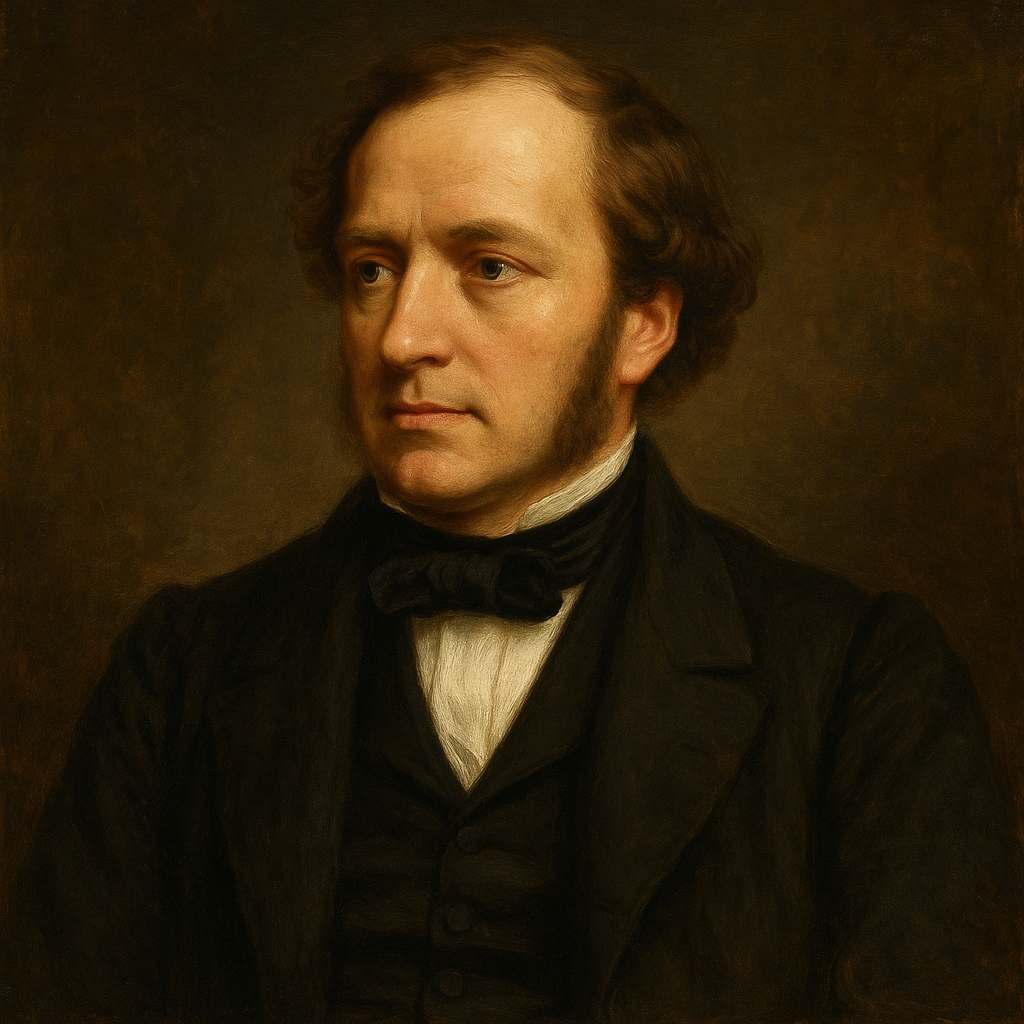A Protest
Arthur Hugh Clough
1819 to 1861

Light words they were, and lightly, falsely said:
She heard them, and she started,—and she rose,
As in the act to speak; the sudden thought
And unconsidered impulse led her on.
In act to speak she rose, but with the sense
Of all the eyes of that mixed company
Now suddenly turned upon her, some with age
Hardened and dulled, some cold and critical;
Some in whom vapours of their own conceit,
As moist malarious mists the heavenly stars,
Still blotted out their good, the best at best
By frivolous laugh and prate conventional
All too untuned for all she thought to say—
With such a thought the mantling blood to her cheek
Flushed-up, and o’er-flushed itself, blank night her soul
Made dark, and in her all her purpose swooned.
She stood as if for sinking. Yet anon
With recollections clear, august, sublime,
Of God’s great truth, and right immutable,
Which, as obedient vassals, to her mind
Came summoned of her will, in self-negation
Quelling her troublous earthy consciousness,
She queened it o’er her weakness. At the spell
Back rolled the ruddy tide, and leaves her cheek
Paler than erst, and yet not ebbs so far
But that one pulse of one indignant thought
Might hurry it hither in flood. So as she stood
She spoke. God in her spoke and made her heard.
Arthur Hugh Clough's A Protest
Arthur Hugh Clough’s A Protest is a compact yet deeply resonant poem that captures a moment of moral and emotional crisis, portraying a woman’s internal struggle between societal pressure and personal conviction. Written in the mid-19th century, the poem reflects the Victorian era’s tensions between conformity and individualism, particularly regarding gender roles and public discourse. Through its vivid imagery, psychological depth, and thematic richness, A Protest transcends its historical moment to speak to universal questions of courage, integrity, and the silencing of dissent.
This essay will explore the poem’s historical and cultural context, its use of literary devices, its central themes, and its emotional impact. Additionally, we will consider Clough’s own intellectual and philosophical influences, including his engagement with religious doubt and social reform, which inform the poem’s moral urgency.
Historical and Cultural Context: Victorian Constraints and the Woman’s Voice
Clough wrote A Protest during a period of profound social and ideological upheaval. The Victorian era was marked by rigid gender norms, where women were expected to embody domestic virtue and remain largely silent in public spheres. The poem’s unnamed female protagonist, who rises to speak against "lightly, falsely said" words, embodies the struggle of women—and indeed any marginalized voice—against oppressive social structures.
The setting—a "mixed company" of judgmental observers—reflects the stifling atmosphere of Victorian social gatherings, where propriety often stifled truth. The "eyes of that mixed company" are described in damning terms: some are "hardened and dulled," others "cold and critical," and still others clouded by "vapours of their own conceit." These descriptors suggest a society that values superficiality over substance, where genuine moral conviction is drowned out by "frivolous laugh and prate conventional."
Clough, a contemporary of Matthew Arnold and influenced by Thomas Carlyle’s critiques of Victorian hypocrisy, often explored themes of doubt and moral courage. His own disillusionment with institutional religion (he resigned his Oxford fellowship due to religious skepticism) informs the poem’s tension between external conformity and internal truth. The woman’s moment of hesitation—her flushed cheeks, her soul’s "blank night"—mirrors the broader Victorian crisis of faith and identity.
Literary Devices: Imagery, Contrast, and Psychological Realism
Clough employs a range of literary techniques to convey the protagonist’s internal conflict and the oppressive weight of societal judgment.
1. Vivid Sensory Imagery
The poem’s power lies in its visceral depiction of the woman’s physiological and emotional response. The "mantling blood" rushing to her cheeks, the "blank night" that darkens her soul, and the eventual paleness that follows create a cinematic intensity. These images evoke the body’s involuntary reactions to fear and shame, grounding the metaphysical struggle in physical reality.
The metaphor of "moist malarious mists" obscuring "heavenly stars" is particularly striking. It suggests how vanity and self-absorption ("vapours of their own conceit") blot out moral clarity, much like disease-ridden air (malaria being a Victorian-era symbol of moral and physical corruption).
2. Contrast and Juxtaposition
Clough contrasts the woman’s initial paralysis with her eventual resolve. The "sudden thought / And unconsidered impulse" that first move her give way to "recollections clear, august, sublime," suggesting a shift from reactive emotion to deliberate moral action. The juxtaposition of her "troublous earthy consciousness" with the "self-negation" that allows her to rise above it reflects a quasi-religious transcendence.
The poem’s closing lines—"God in her spoke and made her heard"—elevate her speech beyond personal defiance to divine sanction, reinforcing the idea that moral truth transcends social convention.
3. Psychological Realism
The poem’s greatest strength is its nuanced portrayal of hesitation and resolve. The woman’s near-fainting ("She stood as if for sinking") captures the physical toll of suppressed speech, while the "one pulse of one indignant thought" that restores her voice illustrates how righteous anger can overcome fear. Clough’s attention to the micro-moments of decision-making anticipates modernist stream-of-consciousness techniques, making the poem remarkably modern in its psychological depth.
Themes: Silence, Moral Courage, and Divine Justice
1. The Silencing of Dissent
The poem’s central tension is between speech and suppression. The woman’s initial impulse to protest is nearly stifled by the weight of collective judgment, symbolizing how societal pressure enforces silence. The observers’ "frivolous laugh and prate conventional" represent the trivializing of serious moral issues—a critique Clough extends to Victorian public discourse more broadly.
2. The Role of Divine Conviction
The woman’s resurgence is framed in almost Miltonic terms, with "God’s great truth, and right immutable" acting as her vindication. Unlike traditional Victorian religious poetry, which often emphasized passive piety, Clough presents faith as an active, defiant force. The phrase "God in her spoke" suggests an immanent divine presence, aligning her protest with a higher justice.
3. Gender and Agency
The protagonist’s gender is crucial: a woman speaking in a mixed assembly would have been transgressive in Clough’s time. Her internalized fear ("all the eyes of that mixed company") reflects the policing of female speech. Yet her ultimate defiance—"She queened it o’er her weakness"—reclaims agency, casting her not as a passive victim but as a sovereign moral actor.
Comparative Analysis: Clough, Arnold, and the Victorian Crisis of Faith
Clough’s poem resonates with the concerns of his contemporaries, particularly Matthew Arnold, whose Dover Beach similarly laments the erosion of moral certainty. However, while Arnold’s tone is elegiac, Clough’s is defiant. Where Arnold sees only the "melancholy, long, withdrawing roar" of faith, Clough suggests that divine truth can still manifest through human courage.
Another illuminating comparison is with Elizabeth Barrett Browning’s Aurora Leigh, which also features a woman overcoming societal constraints to assert her voice. Both works challenge Victorian gender norms, though Clough’s poem is more condensed and psychologically immediate.
Philosophical Underpinnings: Stoicism and Self-Transcendence
The woman’s moment of "self-negation" echoes Stoic philosophy, where true freedom comes from mastering one’s emotional reactions. Yet Clough infuses this with Christian idealism—her weakness is quelled not through sheer will but through alignment with divine truth. This synthesis reflects Clough’s own intellectual struggles, caught between secular rationalism and spiritual yearning.
Emotional Impact: A Moment of Catharsis
The poem’s brevity belies its emotional weight. Readers experience the woman’s panic, her near-defeat, and her triumphant resurgence in quick succession, creating a microcosm of human moral struggle. The final line—"God in her spoke and made her heard"—delivers a cathartic release, affirming that truth, however suppressed, will find expression.
Conclusion: A Timeless Protest
A Protest is more than a period piece; it is a timeless meditation on the cost and necessity of moral courage. Clough’s mastery of psychological realism, his critique of societal hypocrisy, and his fusion of Stoic and Christian ideals make the poem a profound statement on human resilience. In an age where public discourse is still often dominated by "frivolous laugh and prate conventional," Clough’s poem reminds us that the truest protests are those spoken despite the weight of the world’s gaze.
For modern readers, the poem’s power lies in its universality—anyone who has ever hesitated before speaking truth to authority will recognize themselves in its lines. In this way, A Protest endures not only as a Victorian artifact but as an enduring anthem for the silenced and the brave.
This text was generated by AI and is for reference only. Learn more
Want to join the discussion? Reopen or create a unique username to comment. No personal details required!



Comments
No comments yet. Be the first to comment!